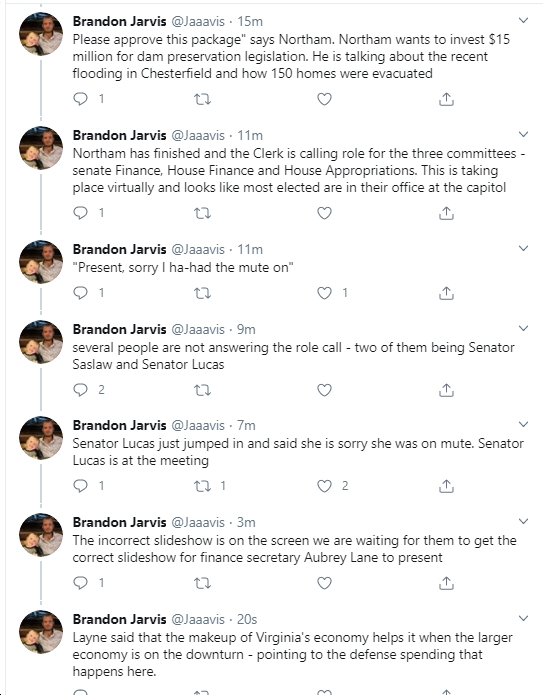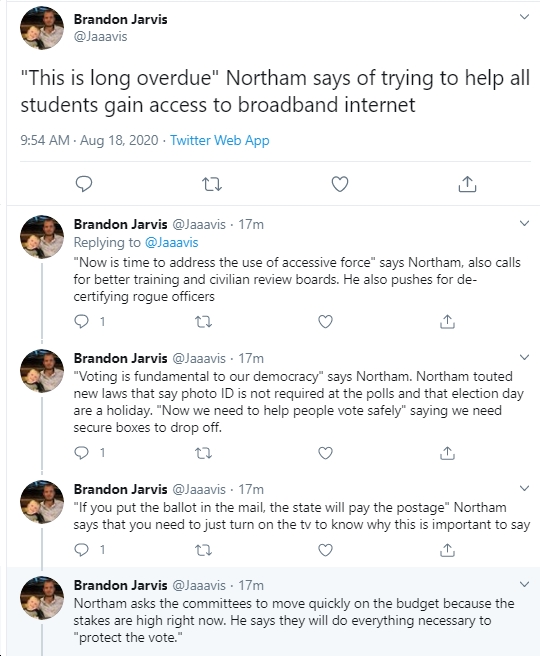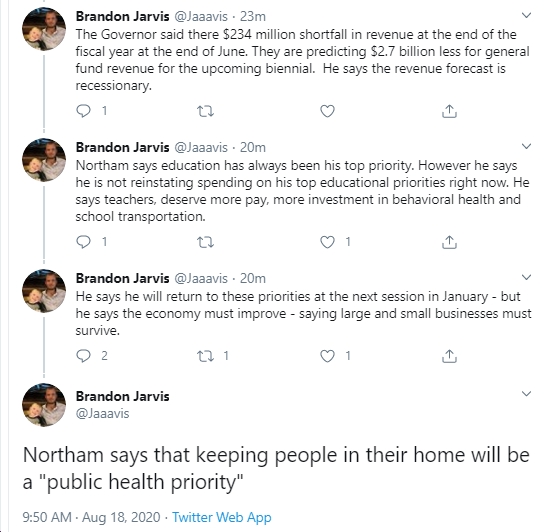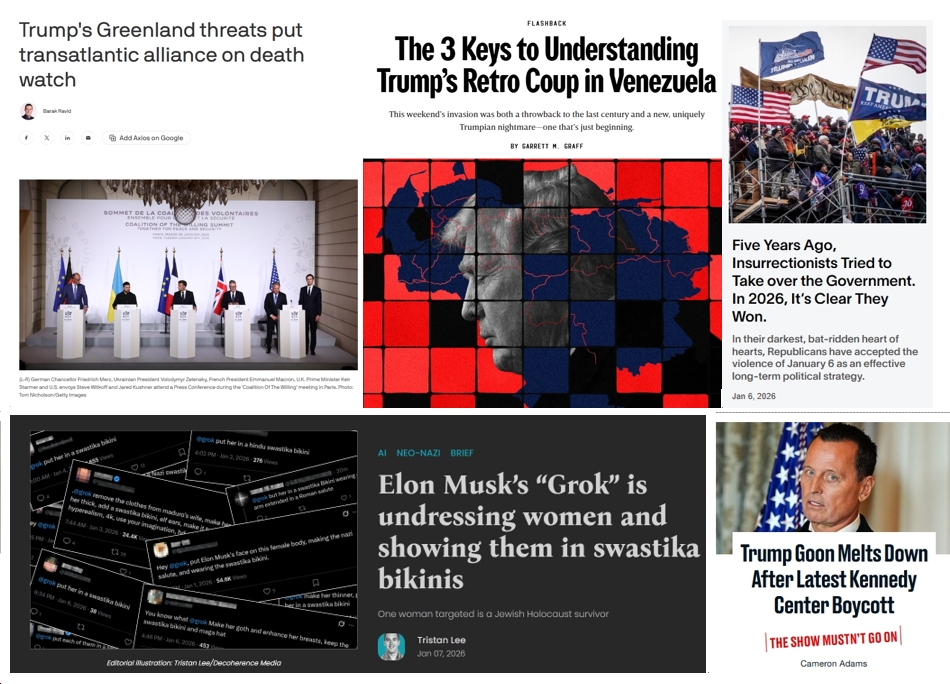See below for video, highlights and a transcript of Governor Northam’s address to the Virginia House and Senate “money committees” this morning, as the General Assembly gathers for an extraordinary special session to consider changes to the budget, given the COVID-19 pandemic, and other measures. Thanks to reporter Brandon Jarvis for the live tweeting – see below. Also note that Sen. Louise Lucas IS in attendance for the budget presentations, despite many Republicans’ demand that she resign and/or “turn herself in immediately.”




Good morning, Chairman Torian, Chairwoman Howell, Chairwoman Watts, Speaker Filler-Corn, Leader Saslaw, members of the General Assembly, ladies and gentlemen. Thank you for the privilege of speaking with you this morning.
We’d rather all be together in person today, but in these times, we are being safe, and relying on technology. I want to thank our IT team for making the technology work.
I would like to recognize Lieutenant Governor Justin Fairfax, Attorney General Mark Herring, First Lady Pam Northam, and members of our Cabinet and staff.
I am here today to update you on the Commonwealth’s revenues for the fiscal year that ended on June 30.
This is a late-August tradition in Virginia, but this is no ordinary year. The COVID-19 pandemic has upended our lives, our economy, and our budget. So I am also here to discuss actions I am proposing for the special session that begins today.
First, I want to discuss the latest efforts to fight the virus in Virginia. Overall, our daily case numbers seem to be trending slightly downward, which is a good thing. We’re now averaging around 15,000 tests a day, and our percent positivity is around 7 percent. These are positive trends, and we continue the work to increase testing and reduce the spread of the virus. We also continue reaching out to communities in need. For example, we’ve distributed more than 542,000 masks and 460,000 bottles of sanitizer to 40 localities through the Health Equity team.
The fact that we are doing this event virtually today speaks to the precautions we all are taking, and must continue to take.
***
Let’s turn to our economy. Last December, I stood before you to outline an ambitious and progressive budget that took Virginia in a new direction that the people demanded. That budget was built on revenues that were good, steady, and growing. This was possible because Virginia boasted a strong economy before the pandemic. We had near-record low unemployment, a stable budget, and strong financial reserves.
So during the regular session, we worked together to craft a forward-looking budget that made generational investments in areas that had been underfunded. It advanced equity like never before, and cared for people who need help. Our budget included investments in early childhood education, tuition-free community college, public schools, affordable housing, our environment, state employees, and the largest reserve balance in state history.
But even as we finalized the details of that plan, we could see that the pandemic was going to impact our revenues and our budget. What we didn’t know was how deep or long-lasting the impact might be.
We suspected it would be painful. And we were right. The United States continues to show recessionary trends. And it’s different from past economic downturns. This time, the cause is not an underlying problem in the economy, as we saw in 2008 when the housing market collapsed. No one could have foreseen that a pandemic would push the world into a recession. So there is no roadmap for how to get out of it.
As a physician, I know the only way to solve our economic crisis is to solve our health crisis first. Our economy was booming before the pandemic, and it can fully rebuild only when this virus is behind us. This means that as we make budget decisions, this week and into the next session, we must keep in mind that we can’t know what is going to happen with the pandemic, when a vaccine will be available, or how much longer this will go on.
So we need to follow the oath that doctors lead with: First, do no harm.
As we begin this special session, it’s important that we all make choices that preserve our financial options, especially for the period from now until the regular session in January. It’s also important to remember that every state is dealing with similar problems. No one has been immune to this crisis.
But states have handled it differently. Other states have slashed services, laid off workers, or furloughed employees to save money. Georgia cut nearly $1 billion from its education funding, while New Jersey is borrowing $10 billion to pay its bills. That’s half our general fund budget. Let me say that again—that’s half our budget.
We can all be very proud to say that in Virginia, we have been able to avoid cutting services or laying off large numbers of state workers. This is no accident. It is the result of taking thoughtful actions, and making prudent decisions. In the first few weeks of the pandemic, we put a freeze on hiring. We limited travel, and froze discretionary spending for state agencies. These actions contributed to unspent balances of $500 million.
At the reconvened session in April, my team worked with you to “unallot” most of the two and a quarter billion dollars in new spending that we had planned in the budget. We agreed that we would return to these important investments, once time had given us a better understanding of how this pandemic would affect our revenues. We also agreed not to make the draconian cuts that some called for. This would have hurt Virginia’s ability to serve people, and it would have slowed down our recovery. These decisions gave us a head start on the budget work we must do now and throughout the fall, and into the next regular session. I’ll talk more about that in a moment.
Before we turn to that, it’s important to acknowledge that we have multiple ways to fund Virginia’s COVID response—not just our general fund. We have the COVID-19 Relief Fund, funded by a new tax on the so-called “gray machines.” We created this fund last session, and we set it up to last one year. It has a clear mission: to help pay for Virginia’s COVID response.
Another source is the federal CARES Act funding—approximately $3.1 billion. We have deployed this money strategically and prudently. We are allocating nearly 45 percent of it to local governments—roughly $1.3 billion. We have allocated more CARES Act dollars to localities than many other states, and we have done so more quickly. We know they are our partners, and they need help.
We have used these dollars to deliver basic services, and help people make it through. This means helping food banks, helping people pay their rent or mortgages, helping small businesses stay in business, helping people get the PPE they need, and a whole lot more. These actions have helped people. And they have kept this problem from being much worse.
So as we turn to the numbers, we all need to understand that the fiscal situation is serious in the Commonwealth, just like in every state. Virginia ended the 2020 fiscal year on June 30th with a $234 million shortfall in general fund revenue collections. While this is significant, it was less than projected, and we still saw an overall revenue increase of 2 percent over fiscal year 2019.
You will recall that some were calling on us to cut $3 billion from the last three months of the last fiscal year. We should be proud that this was not necessary. Looking forward, we now project that we’ll have $2.7 billion less than we expected in general fund revenue for the coming biennium. We feared worse. But this still requires serious and thoughtful budgeting and planning.
The drop in revenue was enough to trigger a reforecast of our economic outlook. The Joint Advisory Board of Economists and the Governor’s Advisory Commission on Revenue Estimates have reviewed these numbers, and they have agreed on a revenue forecast that is recessionary.
This new forecast forms the basis of the budget we are presenting to you in the special session. Secretary Layne and our finance team will present the details in a few minutes.
***
Before we go into that, it’s important to remember where we are in the calendar, the budget cycle, and the pandemic response. In just four months, I will be back before you to present amendments to this budget. In fact, as soon as this special session wraps up, we will immediately begin that process.
In the budget cycle, we are only about six weeks into the fiscal year. Decisions that we make today will affect everything that happens throughout the rest of the two-year budget cycle. And this matters because we don’t know how long the pandemic will go on. Scientists offer a realistic hope that an effective vaccine will be developed in the coming months. Once that happens, it will take time to deploy and help Virginians gain that protection from the COVID-19 virus. We don’t know how long that will take either.
So I encourage all of us to follow a few guideposts for this session:
Number one: “cash is king.” That’s true for our family budgets, especially right now, and it’s true for government budgeting too. We need to preserve the liquidity that will enable us to operate the government, deliver services, and pay our bills.
Number two: Don’t use one-time money to fund expenses that re-occur every year. If you receive an inheritance, and you spend it all today, you’ll have nothing tomorrow. This is common sense, and it’s also something the rating agencies reiterate with us every time they reaffirm our AAA Bond Rating.
Number three: When you DO have one-time money available, the right course is to invest in the future.
And finally, number four, we need to preserve financial options.
***
So let’s turn to specifics. You know that education has always been my top priority. For me, this meant a major expansion of early childhood education, and it meant tuition assistance and creating free community college for people going into high-need fields. I appreciate you endorsing these goals in the final budget you passed.
You will recall that we chose to “un-allot” these new investments earlier this year, once the pandemic hit. In the budget I present to you, I am choosing not to reinstate spending on my own top priorities. To be clear, I am doing this for one reason alone: To preserve our financial options so that we can make it through this pandemic. I need to be equally clear about the priorities we share:
- Teachers and state workers still need and deserve a raise.
- We need to invest more in behavioral health.
- The cost of tuition is still a major impediment.
- And it remains important to invest in our transportation system, and in access to affordable health care.
We all share these priorities, and we will return to them in January, when the time is right. Just as our revenues now look better than we predicted when the pandemic began, we expect the December reforecast to show additional improvement about 16 weeks from now.
But for that to happen and allow us to return to these shared priorities, our economy must show improvement. For that, we need our businesses, large and small, to survive. I talk to CEOs and business leaders regularly, and many of them are facing real challenges. For example, airline travel has dropped 90 percent—that affects all the downstream businesses that supply that industry, many of which are based here in Virginia. Every time a business closes, people lose jobs, and communities lose part of their economic fabric. The pandemic is making businesses at every level rethink how they operate, which could create new opportunities for states looking to bring new business in.
Last year, we were all proud that CNBC named Virginia the best state in which to do business. We are still the best state for business, and as we move forward, we need to remember that keeping employers and jobs here will form the foundation of our economic recovery.
I fully intend to implement and carry out the progressive budget that you and I wrote together this past winter. It’s the right thing to do, and it reflects commitments we made to the people of Virginia.
But we have a crisis before us, so I am sending you a budget and legislation to address this crisis and the issues it has shined a spotlight on. This package will help people stay in their homes, with $88 million to combat evictions and expand affordable housing. This includes funding the eviction diversion pilot program, and making an historic $85 million investment into the Virginia Housing Trust Fund. Keeping people in their homes during this pandemic is a public health priority. That’s why we also created the Rent and Mortgage Relief Program, and it’s why we’ve previously allocated money to help people experiencing homelessness.
This package will help bring more people online—to go to school, go to work, and get connected. It means $85 million for the infrastructure to expand access to broadband and high-speed internet. People in cities, small towns, and rural areas need this. Here’s why: 200,000 K-12 students, and 60,000 college students in Virginia lack access to broadband at home. This is long overdue, and as many schools prepare to start the school year virtually, their students need Internet access to participate.
This package will reform policing. It continues the reforms we began earlier this year, when we increased the felony larceny threshold, decriminalized simple possession of marijuana, began expanding eligibility for parole, and ended driver’s license suspensions that kept people from driving long after they finished their sentences. Now, it’s time to address the use of excessive force. Start training law enforcement officers better and more consistently, with more input from the community. It means civilian review panels, with real skills and standards. It means increasing diversity in the Virginia State Police, so troopers better reflect the communities they serve. And it means that when an officer goes rogue, they’re out of the profession, de-certified.
The package I’m presenting you reaffirms that we need to continue to make it easier to vote, not harder. Voting is fundamental to democracy. Thanks to legislation we passed in the regular session, photo ID is not required at the polls, and Election Day will be a state holiday. And any Virginia voter can vote early with “no excuse” absentee ballots—meaning you can vote early without having to give a reason.
Now, we need to help people vote safely. That means secure boxes to drop off your ballot, in addition to the standard postal service delivery. If you put your ballot in the mail, the state will pay the postage. All you have to do is turn on the TV to see why this is so important, but please know this: the Department of Elections is already working to prepare to start mailing ballots in just four weeks. For these reforms to matter in November, we must make them now. I ask you to move quickly to pass this budget, because the stakes are high for our country. To be clear, voting will be safe and secure in Virginia. Your mailed-in ballots will be counted. Virginia will take every action necessary to protect the vote.
***
When people vote, change happens. Virginians voted last fall, they demanded change, and we started delivering. But change doesn’t come only at the ballot box, especially when people are hurting. We’ve seen that this summer, across America and here in Virginia, as people took to the streets with a message that’s both simple and profound: Change faster.
So I’m sending you a package that lifts up Virginia’s Historically Black Colleges and Universities, funds important cultural sites, and says to the world: This is American history. This package means more students visiting important sites. It means more historic sites and highway markers to tell a broader story. It’s time for Virginia to tell the whole story of American history, and I ask you to approve this package.
And finally, my budget proposes investing $15 million for dam rehabilitation projects that can’t wait, along with other actions to preserve Virginia’s environment. We saw just this weekend across Virginia how important those infrastructure investments are. We had so much rain that 150 homes below a dam in Chesterfield had to be evacuated, and another dam near Pocahontas State Park would have failed had it not recently been upgraded.
Flooding in other communities, like Staunton and Hampton Roads recently, also speak to the fact that water management needs cannot wait. We must be responsible stewards of both the state’s money, and its infrastructure. Luckily, we are not starting from scratch. We have a base budget in place, and it would still allow us to operate the government, even if we made no changes in the coming months.
We also have several options to fund COVID needs: federal CARES Act dollars, the gray machine funding, and our general fund budget. Additional needs for testing, PPE, and food security will require a large portion of the CARES Act dollars that remain. And as tax revenue from the gray machines starts to come in, I look forward to working with you to decide how we can best spend these dollars.
***
My friends, my fellow Virginians, these past few months have been an incredibly difficult time for literally everyone around the world. People have lost jobs. They’ve lost their businesses. Too many have lost their lives. Everyone is worried about what the future holds, and too many leaders are fanning the flames of anxiety. We need to change that too, and we will.
Here in Virginia, we need to plan for the long term, take actions that invest now, and preserve options for what we all hope is a brighter future. We have been making wise decisions throughout this pandemic, and I have faith that Virginia will again propel forward when this pandemic ends. I am proposing a budget and legislative package to make that happen, and I look forward to working with you all to pass these proposals. Thank you.



![Thursday News: “Europe draws red line on Greenland after a year of trying to pacify Trump”; “ICE Agent Kills Woman, DHS Tells Obvious, Insane Lies About It”; “Trump’s DOJ sued Virginia. Our attorney general surrendered”; “Political domino effect hits Alexandria as Sen. Ebbin [to resign] to join Spanberger administration”](https://bluevirginia.us/wp-content/uploads/2026/01/montage010826.jpg)

![Monday News: “Tillis Savages ‘Misinformed’ Trump for ‘Betraying’ Voters”; “Trump’s [Budget] Bill Will Destroy America’s Climate Progress” – and MUCH More!; “What the University of Virginia Should Have Done”; Map of Walkinshaw’s Dominant Victory in VA11](https://bluevirginia.us/wp-content/uploads/2025/06/montage0630.jpg)











